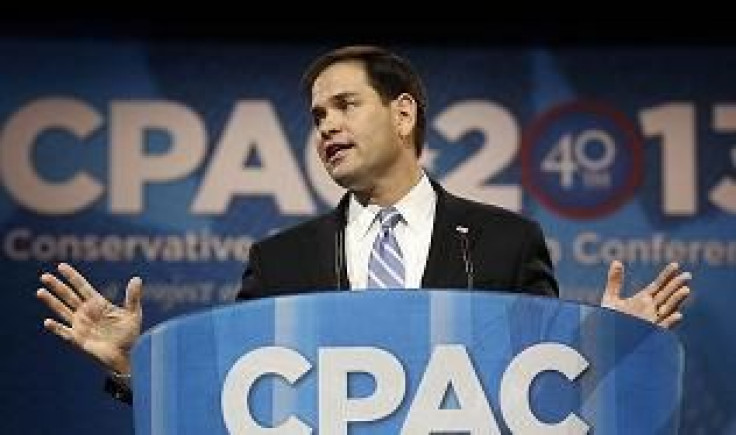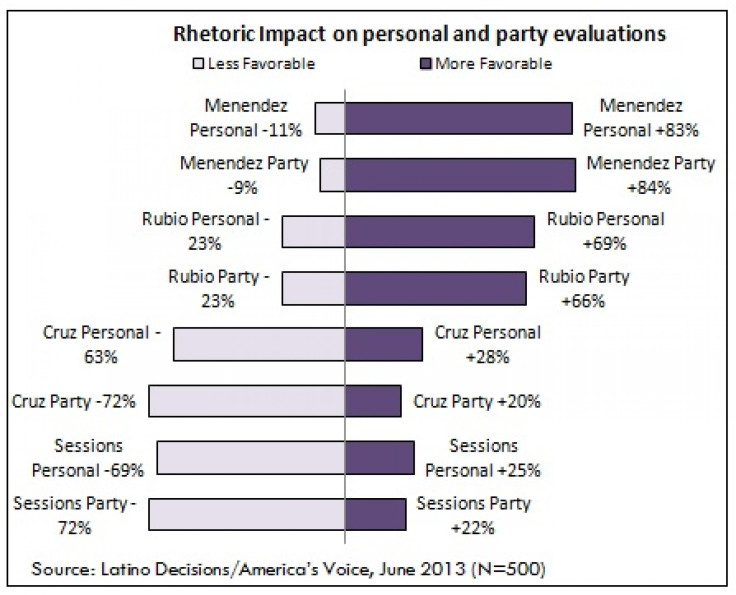What Passing An Immigration Reform Bill Means For Marco Rubio

For months, efforts to pass a comprehensive immigration reform bill in the Senate have shone a bright spotlight on Sen. Marco Rubio, the young, handsome, Hispanic Republican from Florida who figures prominently in everyone's list of 2016 presidential hopefuls. Rubio, whose election in 2010 was a success for the conservative tea party movement, was a key player connecting the Gang of Eight senators who supported the bill and some conservatives who were wary of its implications.
The junior senator from Florida scored a huge political victory on Thursday: The 2013 immigration reform bill cleared the upper chamber with a bipartisan 68-32 vote, just hours after he supported it in a rousing speech on the Senate floor.
“It establishes him more as a national political figure who can draw votes from both Republicans and non-Republicans,” said Paul Beck, a political science professor at Ohio State University who specializes in voting behavior and public opinion. “And if he is interested in being a successful candidate for president or a successful nominee at least, he needs that kind of appeal.”
But Rubio now faces a conundrum. His star is now bigger on the national stage, but its light may have dimmed among his conservative base, which has been described as anti-immigrant. With Ted Cruz of Texas, Rubio is the only Hispanic senator in the Republican Party. That is a problem for a party that must appeal to one of the fastest-growing voting blocs in America if it wants to win the presidency but has so far failed to do so largely because it has been perceived as against immigrants. Supporting an immigration reform bill is fundamental for Rubio, but his party may prove to be too much of a liability for him among Hispanics.
More than half of the Republican senators, after all, voted against the measure.
“There is a rather virulent strain in the Republican Party -- it may dominate, we’ll see -- but a very powerful strain of people who say, ‘No, we shouldn’t open up any kind of path for citizenship,'” Beck said.
But opening that path is exactly what the reform bill would do if it becomes law. An estimated 11 million undocumented immigrants living in America would end up becoming citizens in about 13 years. Most of those 11 million votes are likely to be Democratic, as more than two thirds of Latinos supported President Barack Obama last election.
Enacting the reform bill, the most comprehensive immigration measure to pass in more than 20 years, would also slash nearly $1 trillion from the deficit over 20 years, according to the nonpartisan Congressional Budget Office. That's because legalizing the undocumented means they would be paying taxes, increasing federal tax revenues.
From a political scientist’s point of view, Rubio has another “special problem” because he is Cuban-American. It is so much easier for Cubans than other South Americans to become U.S. citizens because of the “wet foot, dry foot policy” resulting from revisions to the 1966 Cuban Adjustment Act. Any Cuban caught in the water between the two countries has “wet feet” and, therefore sent home. But if they are lucky enough to touch the American shore, then they have “dry feet” and are automatically on their way to legal status and eventually citizenship. This led other Hispanic groups to perceive Cuban-Americans as favored by U.S. immigration policies, Ohio State’s Beck said.
“I think, for a lot of people, particularly Mexican-Americans, they don’t particularly see Cubans as having the same kind of life, of threats, of challenges that they have had,” he added. “I think we often are inclined when we hear Hispanic-American or Hispanic or Asian ... to think of them as sort of this whole group that has a similar view point. And of course they don’t.”
But don’t count Rubio out on account of those issues. According to a recent Gallup poll, with a 58 percent favorability rating, Rubio has the second-most favorable ratings for a potential 2016 candidate among Republicans and Republican-leaning independents. House Budget Chairman Paul Ryan is first.
A majority of Latinos (58 percent) said that immigration reform is the most important issue right now. And, if the Republican Party leads on the subject, then 43 percent of Latinos would be more inclined to vote for it, according to polling firm Latino Decisions.
“I think he clearly recognizes this, and you can see in his own rhetoric and his kind of maneuvering on this bill that he understands that he is in a very tricky position,” Beck said. “And I think he wants to be the more positive Hispanic-oriented face of the Republican Party for the future. By the same token, he does worry about his base.”
But rhetoric can do both harm and good to a lawmaker’s favorability ratings. Check out the graph below:

For now, Rubio's work on the immigration reform bill and his Senate speech on Thursday have positioned him in the eyes of moderates as a compromising leader. To the more conservative crowd, Rubio can point out that he has been steadfast in supporting principles, for example, threatening to walk out of negotiations if a provision granting green cards to the foreign-born same-sex spouse of a U.S. citizen was included in the bill.
But 2016 is three years from now. Whether or not he solves his dilemma, it's a long game for Rubio.
© Copyright IBTimes 2024. All rights reserved.












